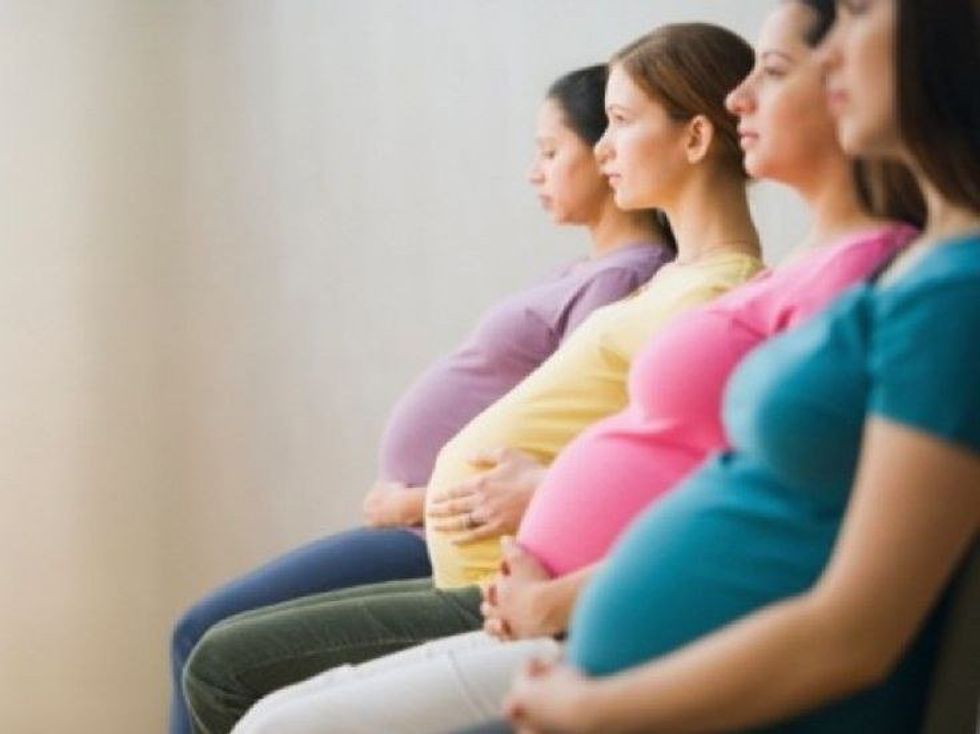“I remembered facts I had learned as a freshman in “sex-education” about teenage pregnancy. Teenage mothers are a burden to society. The children of teenage mother inevitably become crack-addicted gang members. Teenage mothers never successfully complete high school, let alone attend college. These weren't just statistics, I was led to believe, but invariable truths. I had become garbage, worthy only to sit in my isolated desk and cry to myself and throw up in a dirty bathroom stall. I was a pregnant teenage girl.” This is what Allison Crews felt when she discovered that she was pregnant at the age of fifteen (142-143). The example of Crew’s experience reveals the vivid image that society paints pregnant teenagers to be. Though pregnancy may pose health risks for the mother and make her life more difficult, seeing only the downsides neglects too much of the truth to retain accuracy or relevance. Society must shed the social stigma against teen mothers because it can be harmful to mental health, it is hypocritical, and it overlooks the great possibility and potential for success.
Being pregnant can be very scary. Motherhood and parenting put a lot of stress and pressure on parents to make good decisions. They’re expected not to make mistakes because they are now responsible for a whole human who will need clothes, food, shelter and love. That kind of stress can be very overwhelming and can have serious repercussions, both mentally and physically. Shaming teen parents accumulates stress and therefore spawns greater health risks. Teenagers are particularly hormonal and emotional, so being shunned or shamed for a mistake is that much more devastating. Teens are still children too. Fear of rejection and desire for affection are extremely important in an teen life. Teenagers need to feel loved. When they feel shame or lack of acceptance, they may become depressed. “They describe emotions such as feeling ashamed, guilty, stupid, and sad. They feel alone,” according to Robert W. Buckingham. Combining the high stakes of pregnancy with adolescence creates a very emotional, very terrifying situation. Many teens end up feeling pressured into making a decision that is not their own. One source who I interviewed wished to remain anonymous out of fear of shame prolonged to this very day, nearly two decades since her pregnancy. She will be referred to as “Jane Doe.” When she discovered that she was pregnant, she was eighteen and had just graduated high school. After the initial shock of the discovery, Jane’s family was supportive; however, for three days after her mother found out, she didn’t speak to Jane at all. “I already struggled with depression, so that almost sent me into a tailspin,” Jane added. She had attempted suicide just months earlier. Jane then told me a story about how whenever she went out in public while she was pregnant, she would take the tulip ring that her grandmother gave to her, and she would turn it around to appear like it was a wedding band. Jane Doe decided to keep her child and she raised her daughter while living with her parents. About five years later, at the age of twenty-three, Jane Doe was engaged to a man who would become a father for her daughter when she found that she was once again pregnant out of wedlock. She felt like “a failure at life” because she was “too stupid to learn from the first time.” She felt to ashamed to go to her family because she “just knew that they would think of [her] as a slut.” Jane and her fiance concluded that the best option was to get an abortion. Jane Doe got an abortion because of the fear of the judgment of being “a second-time whore.” Society is so harsh to young and unwed mothers that many feel so scared that they do the same thing that Jane did, which can have serious mental effects on the mother. Who knows how different her life could be now? Nevertheless, Jane wouldn’t change anything if she had the opportunity. She know has four beautiful children and one grandchild from her oldest.
It is unreasonable and hypocritical to judge teen girls for getting pregnant. It is impractical to expect teenagers not to make mistakes. According to the National Institution of Mental Health, “the parts of the brain involved in emotional responses are fully online, or even more active than in adults, while the parts of the brain involved in keeping emotional, impulsive responses in check are still reaching maturity.” Because of their tendency to make rash decisions, they find themselves “faced with a very difficult decision at a time in their lives when they don’t feel prepared to” (Buckingham 35). Without the cranial maturity to refrain from impulsive decisions, how can teenagers be held to the same level of expectation of adults? Adults who, incidentally, have all been teenagers and have made mistakes. According to Heather Corinna, in this case age has a limited relevancy. “An unwanted pregnancy has the capacity to disrupt or cause hardship in a woman’s life whether she is 17 or 37” (94). Those that shame teens for their mistakes might not be so quick to do so if their mistakes were on display for the world to see. The big belly makes the mother an easy target for hateful stares in public. Perhaps those who choose to condemn pregnant teens should be required to write their mistakes on their forehead. Teenagers shouldn’t be made to feel convicted for the mistakes that they already “feel very bad about” (Buckingham 35).
Teen pregnancy has a great capacity to result positively. Many teen mothers succeed in their dreams and aspirations (Sinclair 162). Kara Pattinson even attended medical school, despite becoming pregnant at eighteen (Sinclair 165). Sonia McDaniel was seventeen when she became pregnant and she was abused by the father of her child, but she still managed to become a successful model (Sinclair 163). Shaming a pregnant teen implies that she is destined for failure, and these examples show that is clearly not the case. A baby is a blessing, and there are major benefits to having one.Making the baby out to be only a burden is almost deceptive because it leaves out all the good parents about being a parent. According to “What to Expect,” a mother is “likely to feel surges of love and other good feelings whenever [she holds] or [nurses her] little one, thanks to the hormone oxytocin, which plays a big role during bonding. It's so powerful that one dose can fend off anxiety for hours and even days.” Why would shame be relevant here? Motherhood is a place of love. Many teens and young mothers even claim that her child saved her. A lot of teens that get pregnant are in a bad place. Many turn their lives around and grow up overnight for the welfare of their child. Jane Doe, the woman who became pregnant twice before marriage, who had attempted suicide just months before, who described her life as “turmoil,” who lived in fear of being a “whore” and a “slut,” now has her master’s degree in social work and greatly impacts the lives of those she counsels every single day. She frees children from their ghosts and shame and teaches them how to live better lives. Her life is much more meaningful that the lives of her oppressors were. She claims that her child is responsible for motivating her to come out of the dark place she’d been in for so long before. How can someone shame a teen for becoming pregnant when the child saved their life?
Merrium-Webster defines adolescence as “the state or process of growing up.” Merrium-Webster defines shame as “a feeling of guilt, regret, or sadness that you have because you know you have done something wrong.” Do not continue to spread the societal plague of shaming adolescents when they are already mentally unstable. Do not continue to spread the societal plague of shaming adolescents when every adult is just as guilty for making his or her own mistakes daily.Do not continue to spread the societal plague of shaming adolescents for mistakes that are do not doom them for life. This is the year two-thousand and sixteen. Do not shame teen parents for doing things differently than you. Do not be afraid of what you don’t know.





















